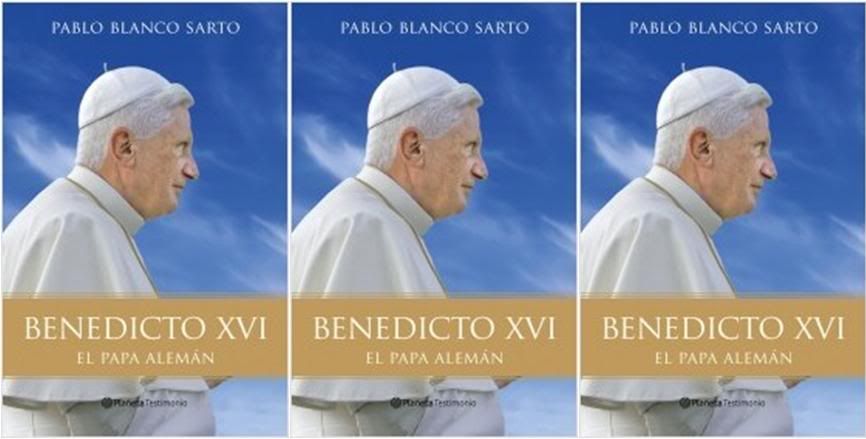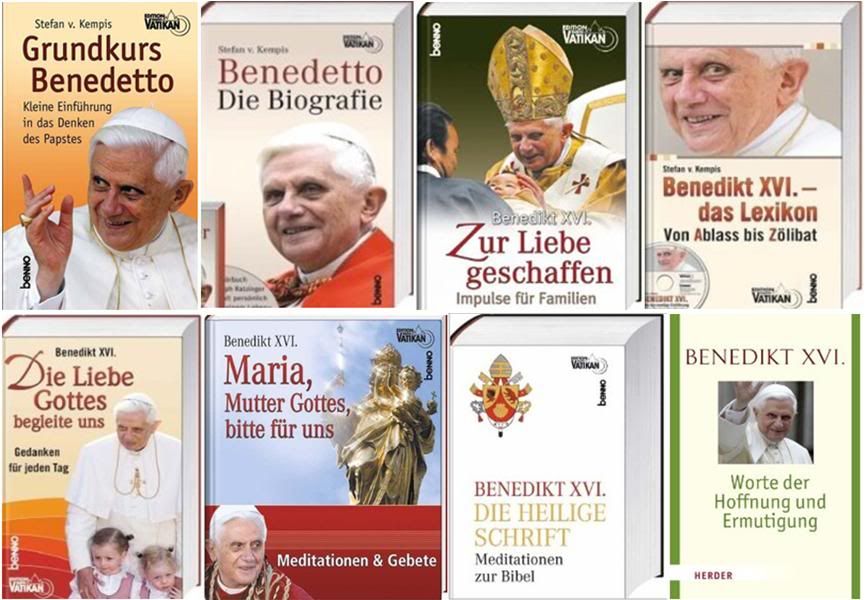 For leading me to this item, thanks to Lella's blog
For leading me to this item, thanks to Lella's blog

- and we must congratulate her because the blog is now on its fourth 'bloglife' (apparently each blogspot can only accommodate a certain number of posts) and, for those who read Italian, it remains the most comprehensive one-stop shop for all things Benedict, thanks to her incomparable diligence and devotion, since she started it in 2007.
'The Pope is defined by his simplicity,
intelligence and good humor':
An interview with a papal biographer
by Santiago Mata
Translated from

MADRID - A philologist with doctorates in philosophy and theology from the University of Navarra, Pablo Blanco Sarto (Zaragoza, 1964) recently published the first major biography of Benedict XVI in Spanish {El Papa aleman, Planeta, 550 pp, 21 euro).
 Blanco previously published three books on Joseph Ratzinger: a biography in 2004; His 300-page doctoral dissertation in theology published in 2005 as Joseph Ratzinger: Razon y Cristianismo; and in 2006, Joseph Ratzinger: Vida y Teologia.
Blanco previously published three books on Joseph Ratzinger: a biography in 2004; His 300-page doctoral dissertation in theology published in 2005 as Joseph Ratzinger: Razon y Cristianismo; and in 2006, Joseph Ratzinger: Vida y Teologia.
The new biography is an 'interior portrait' of Joseph Ratzinger, which completes the image that we have from books like
Light of the World.
What are the traits that define that interior portrait?
In the first place, his straightforward and good-natured simplicity. When he first arrived at the Congregation for the Doctrine of the Faith, the first thing he did was to go around greeting each person on the staff and asking each one to say something about himself.
After that?
His intellectual stature and his capacity to listen, to take everything positive that he can even from positions adverse to Christianity.
His dialog with Juergen Habermas in 2004 is emblematic, because they ended up agreeing that reason and religion should support and purify each other reciprocally.
The third is his sense of humor, his inner tranquility, the hope and joy that he draws from the knowledge that the Church belongs to Christ, not to us.
Was Nazism a trauma for him?
He wad to help man anti-aircraft batteries and was later assigned to a work camp. One night, they were awakened by an SS recruiting officer. And when he was asked what he wished to be, he said simply, "I want to be a priest". One of those present said, "Thanks to his example, the others were able to remain firm [against joining the SS]".
In terms of the pedophile scandals, how would you describe his actions?
That he confronted the issue directly, taking the bull by the horns, so that the guilty are punished both under canonical law as under civilian law. He was able to have the CDF given jurisdiction over such offenses, and at the CDF, he reserved Fridays to deal with the cases brought to them - he did it before praying the Way of the Cross. It is a painful subject that has to be faced and cleared up. There is nothing in Joseph Ratzinger's mentality that would allow deception.
Was he a progressive who later changed sides?
In his thinking, there has been absolutely no rupture. Whatever he wrote during the Council is perfectly consistent with what he wrote about it 10 or 20 years later.
What did he contribute to Vatican-II?
At age 35, he already had a great reputation as a theologian, He collaborated most in the document on Scripture and Tradition, which makes clear that there is only one source of Revelation; as well as in elaborating the idea of collegiality to bridge the primacy of the Pope and his relationship to bishops.
What are we left with after his recent trip to Spain?
The polemics that arose because of what he said on the plane coming in shows that most critics did not understand what he said. He was speaking of the necessary dialog between faith and secularism, but that because of prejudices carried over from the past
[from the Spanish Civil war, in this case], the tendency has been towards antagonism. We cannot dismiss what he really said by leaving it behind a haze. We have to think about it without getting hampered by tribal wars.
When the Pope says that he is concerned about Spain, does he mean because of secular intolerance or the incapacity of Christians to deal with it?
To both. In the absence of rational thought, it is impossible for some in this country to even imagine Ratzinger in dialog with Habermas
[who is Germany's leading contemporary philosopher and an atheist]. Instead of talking to each other rationally, we quarrel. For instance, defense of life and of the family are not just Catholic issues to be dismissed with ideological improvisations.... And now, we still have to reflect on the Pope's recent visit. So far, all we've had is sound and fury in the media.
And here is a review of Blanco's book by a diocesan priest in Santiago de Compostela, one of several bloggers in the stable of a very active online presence called infocatolica.com. His blog name means 'Damascus Gate' ....
'El Papa alemán':
A book review
by Guillermo Juan Morado
Translated from his blog

10/27/10

...The book is a just published biography of the Pope written by Pablo Blanco Sarto,
Benedicto XVI. El Papa alemán (Planeta Testimonio, Barcelona 2010, 606 pp, 21 euros).
He is an Opus Dei priest, who teaches theology at the University of Navarra, with doctorates in philosophy and theology. His doctoral dissertation in theology,
Joseph Ratzinger: Razón y Cristianismo (Rialp, Madrid 2005, 300 pp), is a most engrossing appreciation of the man who besides being Pope is also the best living theologian of the Catholic Church.
Pablo Blanco should be grateful to Providence: How often is it that the author to whom you devote your thesis studies becomes Pope just shortly after you have defended that thesis?
His biography relates events in the history of the Church to the biographical trajectory of the present Pope, but above all, presents us with a map of the theological evolution of Joseph Ratzinger's thought.
This is not just a book for historiographers or for those who are interested in current Church affairs, but above all, it is a book of significant theological interest.
In ten chapters the author brings us closer to the roots as well as the intellectual and existential keys to Benedict XVI's development. His chapters are clearly divided: Germany, Roots, Studies, Vatican-II, Professor, Archbishop, Prefect, Pope, Servant of Servants, and The primacy of love.
Reading it, I became aware for the first time, for instance, of a homily given by the deacon Ratzinger in the Cathedral of Freising in 1950; and similar early homilies on Advent, on the parable of the workers in the vineyard, and even one on St. George.
The ministry of preaching is one for which the present Pope was always well gifted. As Archbishop of Munich, he captivated the faithful every time he gave a homily in the Cathedral. At the time, one of his secretaries recalled, "First, he wrote them out, then he committed them to memory before delivering them".
When he was teaching in Regensburg, he wrote,
"Theology cannot content itself with simply reflecting on the faith in a scientific paradise, while abandoning those whom one must preach to, to their own resources... An idea is only valid when it is communicable".
Reading this book, one realizes that the Pope is essentially what he has always been. One harvests what one sows. And his harvest is splendid: His passion for the truth, for beauty, for love, for the Good news of Christ. A passion that is firm, full of simplicity and patience, of the capacity to listen, and of humbly proclaiming the continuing newness of the faith.
It is not hard to succumb to the discreet enchantment of Pope Benedict XVI. This book helps us to find reasons that will convert that enchantment into virtue.
I linked to this book review by Googling 'El Papa aleman', which has also led me to Morado's review of LOTW, which deserves translation because it is a very orderly and lucid presentation of the book, which is never sidelined by single topics from its awareness of the message that runs through the entire book.... I will post as soon as I can translate it.
BTW, I wish I had an elf who would do nothing but search the Web for all the books that have been written about Joseph Ratzinger/Benedict XVI. I believe no personality in history has ever been written so much about in his lifetime as our beloved Pope. The fact that individual authors in various countries, like Blanco in Spain, and Stefan Kempis in Germany (about whom I posted an interview recently], are able to write multiple books about the same person, almost every year, says something about the worldwide market for books on Benedict XVI as well as by him.... I think it is a major distinction of Benedict XVI, rarely remarked upon perhaps because it is under-estimated, that sets him apart and way above other Popes [or even currently conceivable 'papabile'] and other world leaders and major figures on the world stage.... LOTW itself, in its simultaneous publication in the major languages, is a milestone in more ways than one.

[Modificato da TERESA BENEDETTA 05/12/2010 19:15]